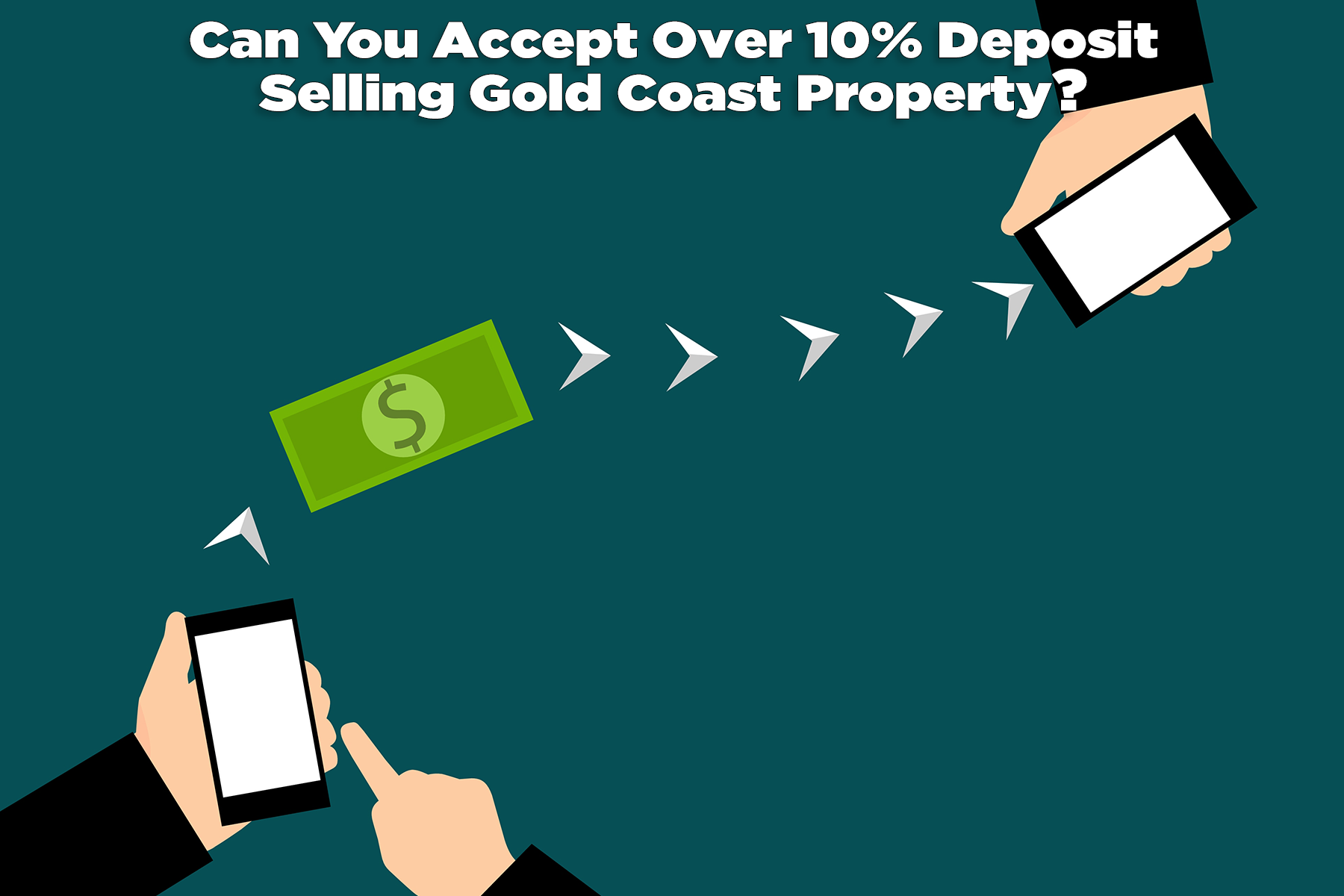
Can You Accept Over 10% Deposit Selling Gold Coast Property?
In short, yes, you can accept more than a 10% deposit when selling a property on the Gold Coast, but doing so may legally change your entire contract. If the buyer pays more than 10% before settlement, Queensland law could reclassify your agreement as an instalment contract, which brings a completely different set of rules, restrictions, and risks for you as the seller. It’s not something most agents will warn you about, but it could significantly impact your rights. Let’s break it down clearly.
Thinking of Selling? Here’s Why Deposits Deserve More Attention
If you’re a Gold Coast homeowner considering a sale, you’re likely juggling a mix of emotions and questions. You might be excited, nervous, or simply overwhelmed by the idea of it all. One thing that often gets skipped in the early conversations, but can become crucial later, is the deposit.
While it’s easy to focus on the sale price or the marketing campaign, overlooking the deposit amount and its legal implications can be costly, especially when that figure starts creeping past the 10% mark.
What is a Property Deposit in Queensland?
A deposit is the buyer’s way of saying, “I’m serious.” It’s an upfront payment, usually held safely in a real estate agency’s trust account, which is deducted from the final purchase price at settlement. If all goes well, it’s smooth sailing. If the buyer pulls out without a valid reason, you may get to keep it.
But it’s not just about money changing hands. In Queensland, the size of the deposit can legally alter the type of contract you’re entering into.
What is a Typical Property Deposit Amount?
There is no fixed rule, but most deposits in Queensland typically range from 5% to 10% of the purchase price. Some buyers pay a small deposit upfront (as an example, 5%), and top it up to 10% later once conditions like finance are sorted.
However, once the total deposit goes over 10%, you’re potentially stepping into instalment contract territory, which isn’t just a legal technicality, but a significant shift in risk and responsibility.
What Happens if a Buyer Offers More Than 10% Deposit to Purchase My Property?
It might feel like a sign of strong commitment: “Great news, the buyer is putting down 20%!” But here’s the catch: in Queensland, that could automatically turn your sale into an instalment contract under the Property Law Act 1974 (Qld).
That change isn’t just semantic. It alters your ability to terminate the contract, restricts how you deal with your property, and hands over more legal protection to the buyer.
What Is an Instalment Contract when Related to Selling Property?
An instalment contract is a special type of property agreement where the buyer pays more than 10% of the purchase price before the title officially transfers.
Instead of one clean settlement, they pay in stages. Sometimes this is intentional, like in vendor finance deals, but more often it happens unintentionally when a large deposit or extra payment is agreed upon without understanding the consequences.
How a Standard Contract Differs from an Instalment Contract
| Standard Sale Contract | Instalment Contract |
| Up to 10% deposit held in trust | Buyer pays over 10% before settlement |
| Title transfers at settlement | Title transfer may be delayed |
| Easy termination for buyer default | Seller must give 30 days to remedy |
| Seller can mortgage or sell again | Buyer can lodge a caveat on the title |
| No caveat rights for buyer | No caveat rights for the buyer |
Why Instalment Contracts Can Be Risky for Sellers
From the outside, a bigger deposit looks like a win. But inside the fine print, it’s a very different story.
Defaulting Gets Complicated
If a buyer defaults under a standard contract, you can usually terminate swiftly. Under an instalment contract, you must give them 30 days to fix the issue. If they do, the deal stays alive, no matter how stressed or inconvenienced you are.
Your Hands Are Tied
Want to refinance, sell, or access equity? You’ll need written consent from the buyer under Section 73 of the Property Law Act. Otherwise, you could be breaking the law.
The Buyer Can Lodge a Caveat
Buyers under instalment contracts can place a non-lapsing caveat on your title. That makes it nearly impossible for you to deal with the property without going to court or waiting them out.
You Might Have to Hand Over the Title Early
If the buyer pays one-third of the purchase price and isn’t in default, they can force you to transfer the property to them, turning you into a lender for the remaining amount.
How Do These Instalment Contracts Happen Accidentally?
It’s more common than you think, especially in hot markets like the Gold Coast, where buyers are keen to secure a deal.
You could accidentally create an instalment contract if:
- The buyer offers more than 10% up front.
- The contract includes additional payments made before settlement (even if a different name refers to them).
- The total money paid before settlement adds up to over 10%, regardless of intention.
What About Early Deposit Releases?
Good news: if a portion of the deposit (within 10%) is released to you early from the trust account, that alone doesn’t make it an instalment contract. As long as the overall pre-settlement payments stay at or below 10%, and the money is clearly defined as a deposit, you’re in safe waters.
Let’s Talk Emotions: Selling Is a Big Deal
This isn’t just a legal matter; it’s personal. For many Gold Coast homeowners, selling is tied to life changes: downsizing, growing families, new jobs, or fresh starts. It’s okay to feel uncertain, even a little hesitant.
Here are some emotional checkpoints I often hear:
“What if the buyer backs out?”
That’s what deposits are for. If your contract is clear and the buyer pulls out without a valid reason, you may be entitled to keep the deposit.
“I don’t know where I’d go next.”
That’s normal. You can plan for flexible settlement dates or explore short-term rentals to give yourself breathing room. The Gold Coast market moves quickly, so timing is everything.
“I’m worried I’ll miss something important.”
That’s what your solicitor or conveyancer is there for. From deposits to disclosures, they will help you feel fully informed.
Practical Advice for Getting Ready to Sell
Whether you’re three weeks or three months away from listing, here are a few steps that will help:
- Start decluttering: One cupboard at a time. Less stuff makes homes look more spacious.
- Get a sense of your property’s value: Look at recent local sales (not just listed prices). Request a Comparative Market Analysis from me.
- Speak with your bank or broker: Understand your equity and what you can afford next.
- Collect your paperwork: Rates notices, renovation receipts, appliance warranties.
- Consider minor upgrades: Paint touch-ups, garden refreshes, or replacing dated fittings.
- Look into professional styling: It can make a noticeable difference in price and time on market.
What Most Agents Don’t Say About Deposits
Plenty of agents celebrate big deposits as a sign of strength, but they won’t always explain what it legally means for you. Accepting more than 10% may expose you to more risk, not less.
You deserve an agent who tells you the whole story, not just the headline, someone who understands the legal, emotional, and financial weight of the decision you’re making.
That’s my approach. Calm. Honest. Local.
Selling Gold Coast Property Doesn’t Have to Be Complicated
You’re not just selling a house, you’re navigating a significant life transition. And the last thing you need is legal surprises or rushed decisions. Whether you’re ready to list or still asking “what if,” you deserve clear, practical advice tailored to your situation.
Understanding how deposits work, especially those over 10%, is one of those make-or-break moments. Obtaining accurate information now could save you from legal headaches later.
When you’re ready, I’m here. No pressure. No jargon. Just experience, insight, and a genuine understanding of the Gold Coast property market.
Author – Craig Douglas
Please Note: The information contained in this document is for general information purposes only and does not constitute legal advice. The laws and regulations governing the sale of property in Queensland are complex and constantly changing. It is important to seek the advice of a qualified property lawyer or conveyancer before making any decisions about the sale of your property. This document does not take into account your individual circumstances and may not apply to your situation. By reading this document you agree that you have not relied on the information contained herein and that you will seek independent legal advice before taking any action.

Are you ready for a conversation about selling your Gold Coast home?
Let’s get you Selling
LET’S GET YOU SOLD!
Craig Douglas 0418 189 963
Professional | Knowledgeable | Experienced
Some of the suburbs that I proudly sell homes in:
Reedy Creek
This page was proudly created by Craig Douglas, your local independent Gold Coast real estate agent, working for a Boutique Real Estate Agency. Selling residential and commercial properties, from those that are awe-inspiring, through to a diamond-in-the-rough, otherwise known as a “renovator’s delight“.
I negotiate and sell on behalf of property owners who want to get the best possible price, with the least amount of hassle. Let’s talk about the process of selling your property over a coffee to get you started – 0418 189 963

